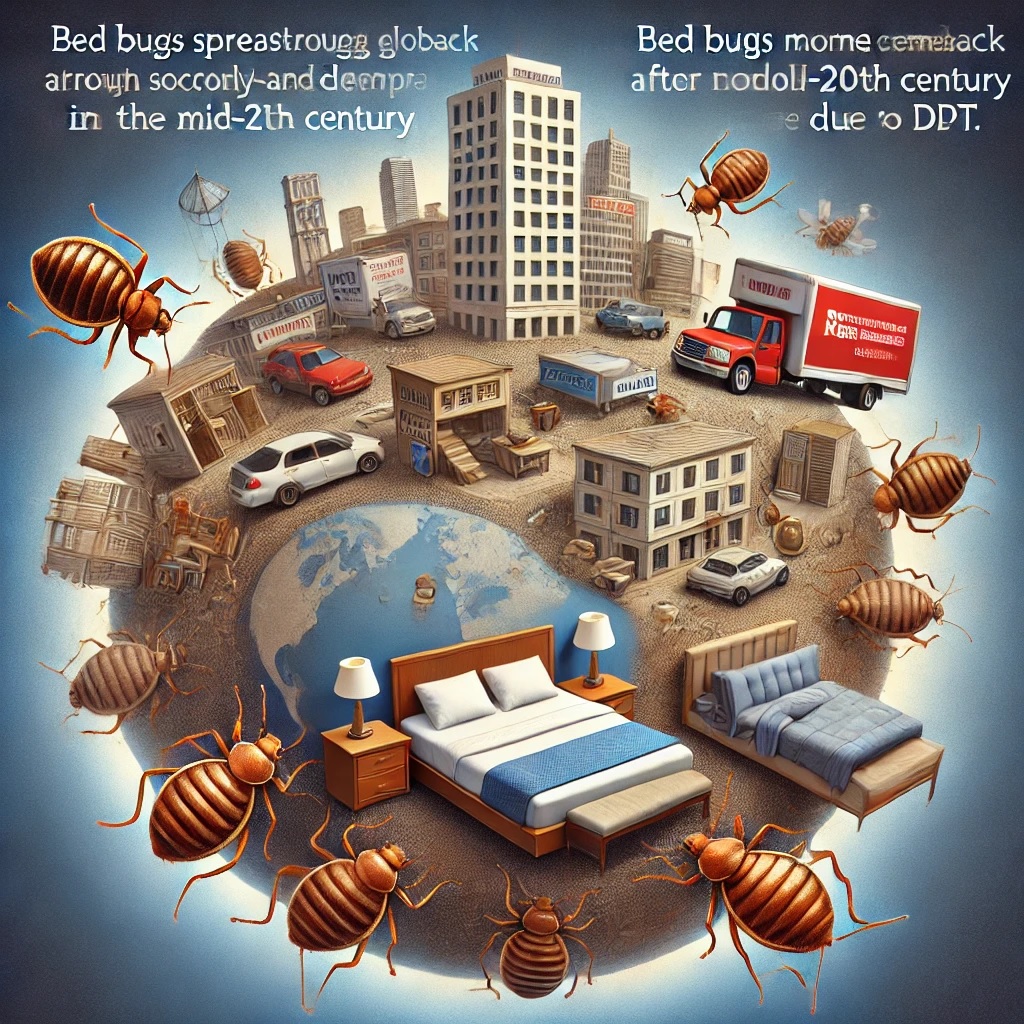By ThermoPest – Your Local Pest Control Experts
It’s hard to believe now, but there was once a time when bed bugs were practically a thing of the past. In the mid-20th century, thanks to some pretty strong chemicals (we’ll get to that), bed bugs were on the brink of disappearing. So, how did we go from almost eradicating these little pests to having a full-blown resurgence in the 21st century? Let’s take a closer look at how bed bugs managed to make a sneaky comeback.

Back in the day, bed bugs were everywhere. From humble homes to high-end hotels, they didn’t discriminate. But the introduction of DDT in the 1940s and 50s changed everything. DDT was a pesticide so effective that it seemed to wipe bed bugs off the face of the earth. You’d hardly hear a peep about them from the mid-1950s right up until the 1990s.
It was during this time that people got a bit too comfortable. Bed bugs weren’t the problem they used to be, so many thought we had seen the last of them. But, as history shows, bed bugs are resilient creatures, and they were quietly biding their time.
Now, if you’ve done any travelling in recent years, you might have heard whispers of bed bugs lurking in hotel rooms or even spotted warnings on travel forums. This wasn’t a problem people talked about much back in the day, but globalisation played a huge role in the bed bug comeback tour.
With the rise of international travel and trade, bed bugs hitched rides across borders, stowed away in suitcases, clothing, and even on people themselves. One day, you’re enjoying a luxury hotel in Paris, and the next, you’re battling an infestation back home. The thing about bed bugs is, they spread fast, and with global travel at an all-time high, it was like they got a passport to the world.
Here’s where it gets tricky. Remember that miracle chemical, DDT? Well, it turns out bed bugs weren’t going down without a fight. Over the years, they developed resistance to not just DDT, but also to newer chemicals like pyrethroids. Essentially, bed bugs became tougher, smarter, and harder to kill.
It’s a bit like when you get a cold, and the doctor says, “Don’t overuse antibiotics.” Why? Because bacteria can become resistant. The same happened with bed bugs—they adapted to the very chemicals that once kept them at bay.
By the time the 21st century rolled around, pest control methods had shifted towards less toxic, more eco-friendly solutions, which, while better for the environment, weren’t always as effective against these now-super-tough bed bugs. Combine that with their growing resistance, and you’ve got the perfect storm for a resurgence.
As environmental concerns grew, there was a shift away from using harsh chemicals like DDT, which had been linked to negative environmental effects and health issues. The ban on DDT in many countries in the 1970s was a turning point. While it was a win for the environment, bed bugs saw it as an opportunity to stage a comeback.
The newer, less toxic methods that followed were safer but often less effective against a pest that had evolved to survive. Pest control companies had to adapt, but with fewer potent weapons in their arsenal, it became harder to keep infestations under control.
Another reason bed bugs have bounced back is simply how we live today. Think about the rise of second-hand furniture and the “fast fashion” of home décor. How often do we hear about someone picking up a cheap sofa from a charity shop or buying a vintage wardrobe at a car boot sale? While that’s great for the wallet, it can be a nightmare for bed bug control. Bed bugs love nothing more than sneaking into a new home via used furniture.
On top of that, rental properties and shared accommodations, such as student housing and hostels, offer bed bugs a perfect opportunity to spread. Combine this with economic factors—like people cutting back on professional pest control services during tough financial times—and it’s easy to see how bed bugs have made their way back into our lives.
One of the biggest problems when bed bugs started to resurface in the early 2000s was that people simply weren’t prepared. After decades without them, many didn’t recognise the signs of an infestation. It wasn’t uncommon for someone to have bed bugs for weeks before realising what was going on, which gave the pests plenty of time to spread.
By the time people did figure out they had a problem, it was often too late for simple DIY methods. Public awareness campaigns, particularly in cities, have helped raise awareness, but education is still key in preventing infestations.
So, where does that leave us today? Fortunately, pest control has come a long way, and while bed bugs are more resilient than ever, so are our methods of dealing with them. Heat treatments, which use high temperatures to kill bed bugs at all stages of their life cycle, have proven incredibly effective and are now a go-to solution for infestations.
New detection methods, such as specially trained bed bug-sniffing dogs and advanced monitoring devices, help catch infestations early, before they spread. Integrated Pest Management (IPM) is another modern approach that combines multiple strategies to tackle bed bugs, including chemical treatments, heat, and prevention.
Bed bugs may have staged a successful comeback in the 21st century, but it’s not all bad news. We now know more than ever about how they spread, how they adapt, and most importantly, how to get rid of them. At ThermoPest, we’ve been keeping an eye on these pests for years, and while the challenge has evolved, we’ve got the experience and the tools to tackle even the most stubborn infestations.
If you’re facing a bed bug problem, don’t wait for it to get worse. Get in touch with ThermoPest today, and let’s make sure bed bugs stay in the past, where they belong.